This second of two columns introducing the 2019 Notable Books for a Global Society (NBGS) includes nonfiction and fiction books that inform, entertain, and touch the heart. The extended article on the NBGS books with teaching ideas and a collection of connecting books will be published in the spring 2019 issue of The Dragon Lode, the journal of the Children’s Literature and Reading Special Interest Group.
Ages 4–8
Alma and How She Got Her Name. Juana Martinez-Neal. 2018. Candlewick.
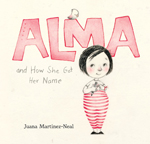 What’s in a name? Too much, thinks Alma Sofia Esperanza José Pura Candela. When her Daddy shows her the family photo album and tells her the story of each relative, Alma loves the stories, but wants to know about her own name. He tells her, “You are the first and only Alma. You will make your own story.” The illustrations, featuring a charming Alma, were done as print transfers with graphite and colored pencils on handmade textured paper. In “A Note from Juana,” Martinez-Neal, a native of Lima, Peru, who now lives in the United States, tells the story of her name and encourages readers to do the same.
What’s in a name? Too much, thinks Alma Sofia Esperanza José Pura Candela. When her Daddy shows her the family photo album and tells her the story of each relative, Alma loves the stories, but wants to know about her own name. He tells her, “You are the first and only Alma. You will make your own story.” The illustrations, featuring a charming Alma, were done as print transfers with graphite and colored pencils on handmade textured paper. In “A Note from Juana,” Martinez-Neal, a native of Lima, Peru, who now lives in the United States, tells the story of her name and encourages readers to do the same.
—JH
The Day You Begin. Jacqueline Woodson. Ill. Rafael López. 2018. Nancy Paulsen/Penguin.
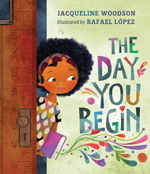 Everyone has a story, but why does everyone else’s story seem more exciting than ours? Children often feel different and alone in school, whether because of their hair, skin color, language, clothes, the food they eat, or physical limitations. Jacqueline Woodson’s gentle text and Rafael López’s bright mixed-media illustrations tell the story of how a classroom of young children discover that they are more alike than different when they begin to share their stories and take pride in their differences. A Spanish edition, El día en que descubres quién eres, is available.
Everyone has a story, but why does everyone else’s story seem more exciting than ours? Children often feel different and alone in school, whether because of their hair, skin color, language, clothes, the food they eat, or physical limitations. Jacqueline Woodson’s gentle text and Rafael López’s bright mixed-media illustrations tell the story of how a classroom of young children discover that they are more alike than different when they begin to share their stories and take pride in their differences. A Spanish edition, El día en que descubres quién eres, is available.
—JH
Love. Matt de la Peña. Ill. Loren Long. 2018. Putnam/Penguin.
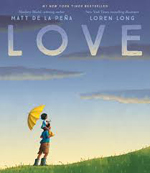 Newbery Award winner Matt de la Peña’s poetic text expresses how, in times of joy and in times of hardship, sometimes alone and at times with others, everyone experiences love. “In a crowded concrete park, / you toddle toward summer sprinklers / while older kids skip rope / and run up the slide, and soon / you are running among them, / and the echo of your laughter is love.” Loren Long’s illustrations, rendered in collaged monotype prints, acrylic paint, and pencil, contribute to the reader’s understanding of the many ways love is experienced by depicting diverse individuals in different situations. Children, as well as the adults who share the book with them, will find new meanings with each reading of the book. A Spanish edition, Amor,is available.
Newbery Award winner Matt de la Peña’s poetic text expresses how, in times of joy and in times of hardship, sometimes alone and at times with others, everyone experiences love. “In a crowded concrete park, / you toddle toward summer sprinklers / while older kids skip rope / and run up the slide, and soon / you are running among them, / and the echo of your laughter is love.” Loren Long’s illustrations, rendered in collaged monotype prints, acrylic paint, and pencil, contribute to the reader’s understanding of the many ways love is experienced by depicting diverse individuals in different situations. Children, as well as the adults who share the book with them, will find new meanings with each reading of the book. A Spanish edition, Amor,is available.
—TM
Saffron Ice Cream. Rashín Kheiriyeh. 2018. Scholastic.
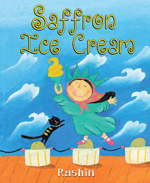 On her first trip to the beach in Brooklyn, New York, her new home after her family left Iran, Rashin can't help but compare Coney Island to the beach on the Caspian Sea. She misses the fun of swimming with her friend, Azadeh, but she is delighted to see an ice cream truck. When she learns that this ice cream seller does not have the saffron ice cream she and Azadeh loved to buy, however, Rashin bursts into tears. A girl standing nearby sees Rashin’s disappointment and suggests that she try chocolate crunch, her favorite. New favorite ice cream! New friend! The brightly colored, action-packed illustrations capture the energy and emotions of experiencing a new place and provide a window into understanding the need to reach out to newcomers.
On her first trip to the beach in Brooklyn, New York, her new home after her family left Iran, Rashin can't help but compare Coney Island to the beach on the Caspian Sea. She misses the fun of swimming with her friend, Azadeh, but she is delighted to see an ice cream truck. When she learns that this ice cream seller does not have the saffron ice cream she and Azadeh loved to buy, however, Rashin bursts into tears. A girl standing nearby sees Rashin’s disappointment and suggests that she try chocolate crunch, her favorite. New favorite ice cream! New friend! The brightly colored, action-packed illustrations capture the energy and emotions of experiencing a new place and provide a window into understanding the need to reach out to newcomers.
—JH
Ages 9–11
Dreamers. Yuyi Morales. 2018. Neal Porter/Holiday House.
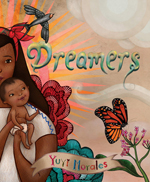 Yuyi Morales tells the story of immigrating to the United States with her infant son, discovering “so many things we didn’t know. Unable to understand and afraid to speak, we made lots of mistakes.” The poetic text and brightly colored, imaginative illustrations (done in acrylic, pen and ink, and collage) convey her wonder at discovering the solace of the library where she and her son pore over picture books. Back matter includes details of Morales’ own story of coming to the U.S. with her 2-year-old son from Ciudad Juarez, a list of picture books that inspired her, and information on how she made the book. A Spanish edition, Soñodores, is available.
Yuyi Morales tells the story of immigrating to the United States with her infant son, discovering “so many things we didn’t know. Unable to understand and afraid to speak, we made lots of mistakes.” The poetic text and brightly colored, imaginative illustrations (done in acrylic, pen and ink, and collage) convey her wonder at discovering the solace of the library where she and her son pore over picture books. Back matter includes details of Morales’ own story of coming to the U.S. with her 2-year-old son from Ciudad Juarez, a list of picture books that inspired her, and information on how she made the book. A Spanish edition, Soñodores, is available.
—TM
Finding Langston. Lesa Cline-Ransome. 2018. Holiday House.
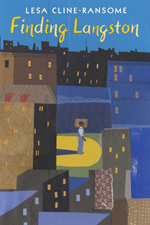 In this story set in 1946, 11-year-old Langston has moved with his father from Alabama to the south side of Chicago following the death of Langston’s mother. In his effort to elude bullies after school, Langston runs to the library. Unlike the whites-only library in Alabama, this one welcomes everyone. The library is a safe haven where Langston can check out as many books as he wants. The books change how Langston sees himself, and when he discovers Langston Hughes, reading his poems and sharing the books with his father, he learns more about his mother, whom he misses, and forges a bond with his father.
In this story set in 1946, 11-year-old Langston has moved with his father from Alabama to the south side of Chicago following the death of Langston’s mother. In his effort to elude bullies after school, Langston runs to the library. Unlike the whites-only library in Alabama, this one welcomes everyone. The library is a safe haven where Langston can check out as many books as he wants. The books change how Langston sees himself, and when he discovers Langston Hughes, reading his poems and sharing the books with his father, he learns more about his mother, whom he misses, and forges a bond with his father.
—TM
La Frontera: El viaje con papá/My Journey with Papa. Deborah Mills & Alfredo Alva. Ill. Claudia Navarro. 2018. Barefoot.
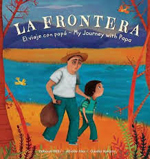 Set in central Mexico in the 1980s, Alfredo’s family needs to find a new home when harvesting pine nuts in the pinyon forest can no longer support them. Written in Spanish and then English and accompanied by warm, colorful, mixed-media artwork, La Frontera recounts the dangerous and uncertain journey Alfredo and his father take crossing the border into the United States and living for weeks in a camp. Finding a home in a Texas town, Alfredo goes to school and feels part of a community as he and his father build a life to support and reunite the family four years later. Back matter includes photographs of Alfredo’s family and home in central Mexico and information on immigrants and immigration across the Mexico–U.S. border.
Set in central Mexico in the 1980s, Alfredo’s family needs to find a new home when harvesting pine nuts in the pinyon forest can no longer support them. Written in Spanish and then English and accompanied by warm, colorful, mixed-media artwork, La Frontera recounts the dangerous and uncertain journey Alfredo and his father take crossing the border into the United States and living for weeks in a camp. Finding a home in a Texas town, Alfredo goes to school and feels part of a community as he and his father build a life to support and reunite the family four years later. Back matter includes photographs of Alfredo’s family and home in central Mexico and information on immigrants and immigration across the Mexico–U.S. border.
—SW
Write On, Irving Berlin! Leslie Kimmelman. Ill. David C. Gardner. 2018. Sleeping Bear.
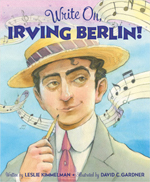 In 1893, Israel Baline and his family immigrate to the United States, fleeing pogroms in Russia. The family brings with them a tradition of music, and in school, Israel daydreams of music. At age 13, after his father’s death, he becomes a singing waiter and begins writing lyrics reflecting pride in his adopted country. Throughout his life, he continues to write poignant songs such as “White Christmas” and riotous songs such as those in the musical Annie Get Your Gun. Brightly hued, delicate illustrations, rendered in graphite and watercolor, convey the heart and feeling of his songs. Back matter includes additional biographical information on Irving Berlin (1888–1989), a list of his favorite songs, and a book list.
In 1893, Israel Baline and his family immigrate to the United States, fleeing pogroms in Russia. The family brings with them a tradition of music, and in school, Israel daydreams of music. At age 13, after his father’s death, he becomes a singing waiter and begins writing lyrics reflecting pride in his adopted country. Throughout his life, he continues to write poignant songs such as “White Christmas” and riotous songs such as those in the musical Annie Get Your Gun. Brightly hued, delicate illustrations, rendered in graphite and watercolor, convey the heart and feeling of his songs. Back matter includes additional biographical information on Irving Berlin (1888–1989), a list of his favorite songs, and a book list.
—SW
Ages 12–14
Amal Unbound. Aisha Saeed. 2018. Nancy Paulsen/Penguin.
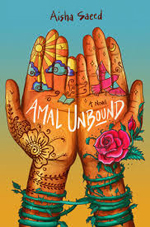 When her mother gives birth to another daughter and becomes so depressed she can’t get out of bed, Amal, an independent and resourceful girl who loves school and learning, stays home in her Punjabi village of Pakistan to help with the baby and the housework. Amal misses school and thinks her life is over, yet things get worse when, one day, on the way to the market, she insults Jawad Sahib, the most powerful man in the region. As retribution, she must work as his house servant. Although she misses her family and school, Amal is dutiful in her servitude and her sense of justice earns her the respect of the other servants.
When her mother gives birth to another daughter and becomes so depressed she can’t get out of bed, Amal, an independent and resourceful girl who loves school and learning, stays home in her Punjabi village of Pakistan to help with the baby and the housework. Amal misses school and thinks her life is over, yet things get worse when, one day, on the way to the market, she insults Jawad Sahib, the most powerful man in the region. As retribution, she must work as his house servant. Although she misses her family and school, Amal is dutiful in her servitude and her sense of justice earns her the respect of the other servants.
—JH
The Crossroads. Alexandra Diaz. 2018. Paula Wiseman/Simon & Schuster
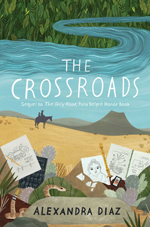 In this sequel to The Only Road (2016) in which Jaime Rivera and his cousin Ángela made the journey from Guatemala to the United States to live with Jaime’s brother Tomás, in New Mexico, 12-year-old Jaime, who does not speak English, doesn’t like having to go to school, unlike Ángela who easily makes friends. While trying to learn a new language, Jaime deals with a bully, grows anxious about the friendships Ángela is making, and worries when he hears that his Abuela is not well. Diaz considers timely issues immigrants face as she tells the story of the challenges Jaime has in middle school. A Spanish edition, La encrucijada, is available.
In this sequel to The Only Road (2016) in which Jaime Rivera and his cousin Ángela made the journey from Guatemala to the United States to live with Jaime’s brother Tomás, in New Mexico, 12-year-old Jaime, who does not speak English, doesn’t like having to go to school, unlike Ángela who easily makes friends. While trying to learn a new language, Jaime deals with a bully, grows anxious about the friendships Ángela is making, and worries when he hears that his Abuela is not well. Diaz considers timely issues immigrants face as she tells the story of the challenges Jaime has in middle school. A Spanish edition, La encrucijada, is available.
—TM
The Night Diary. Veera Hiranandani. 2018. Dial/Penguin.
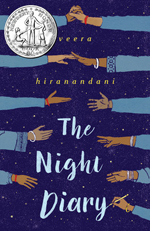 Twelve-year-old Nisha begins to keep a diary just before the partition of India in 1947 creates two countries, Pakistan and India. Her Muslim mother has died, and the lives of her Hindu family in Mirpur Khas, a southern city in what becomes Pakistan, become endangered. They leave their comfortable home for India, walking because train travel is too dangerous. In dated diary entries written to her deceased mother, Nisha records the danger and deprivation her family faces as people on both sides of the new border are killed as they migrate to Jodhpur, in western India. Back matter includes a glossary and an author’s note providing historical context and discussion of the separation of fact from fiction in the novel.
Twelve-year-old Nisha begins to keep a diary just before the partition of India in 1947 creates two countries, Pakistan and India. Her Muslim mother has died, and the lives of her Hindu family in Mirpur Khas, a southern city in what becomes Pakistan, become endangered. They leave their comfortable home for India, walking because train travel is too dangerous. In dated diary entries written to her deceased mother, Nisha records the danger and deprivation her family faces as people on both sides of the new border are killed as they migrate to Jodhpur, in western India. Back matter includes a glossary and an author’s note providing historical context and discussion of the separation of fact from fiction in the novel.
—SW
Ages 15+
Buried Beneath the Baobab Tree. Adaobi Tricia Nwaubani. 2018. Katherine Tegen/HarperCollins.
 Ya Ta, the best student at her school, enjoys her friends and helps her family in their rural village in Northeast Nigeria. She longs to win a state scholarship to earn a university degree so she can teach, but worries that Success, the boy she loves, will not want so educated a woman. Told in vignettes, the novel depicts the destruction of her family life and hopes when Boka Haram rebels attack the village and kidnap women and girls moving them deep into the forest. Ya Ta’s captivity challenges her beliefs and dreams as she strives to survive each day. Back matter includes an afterword by journalist Vivian Mazza with information on the history of the jihad rebels who became known as Boka Haram (a Hausa term meaning “Western education is forbidden”) and the stories of individual women who escaped capture and a list of resources.
Ya Ta, the best student at her school, enjoys her friends and helps her family in their rural village in Northeast Nigeria. She longs to win a state scholarship to earn a university degree so she can teach, but worries that Success, the boy she loves, will not want so educated a woman. Told in vignettes, the novel depicts the destruction of her family life and hopes when Boka Haram rebels attack the village and kidnap women and girls moving them deep into the forest. Ya Ta’s captivity challenges her beliefs and dreams as she strives to survive each day. Back matter includes an afterword by journalist Vivian Mazza with information on the history of the jihad rebels who became known as Boka Haram (a Hausa term meaning “Western education is forbidden”) and the stories of individual women who escaped capture and a list of resources.
—SW
The three reviewers are members of the 2019 Notable Books for a Global Society Committee. Sandip Wilson, cochair of the committee, serves as professor in the School of Education, Husson University, Bangor, Maine. Mary Ellen Oslick is an assistant professor in the Department of Education at Stetson University, DeLand, Florida. Junko Sakoi is program coordinator of the Multicultural Curriculum Department at Tucson Unified School District, Arizona.
These reviews are submitted by members of the International Literacy Association's Children's Literature and Reading Special Interest Group (CL/R SIG) and are published weekly on Literacy Daily.